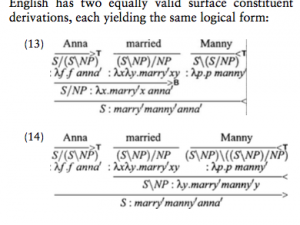The Generic Style Rules for Linguistics, whose widespread adoption will make linguistics publication more efficient, normally adopt the most widely used practices, but sometimes it is not so easy to say which practice is the most widespread, and in this cases a choice had to be made, ideally on the basis of rational principles. One such principle is:
(P1) Neutralize as little information as possible.
Thus, given names should not be abbreviated (because an abbreviation like “H.” neutralizes the distinction between Hans and Hankyung, for example).
But the princple also argues against special capitalization (also known as “title case”) in English, the rule according to which titles of books (and sometimes also of articles) get special capitals on some of the words. For example, the following reference can appear in two different forms:
Without special capitalization (“sentence case”, as in the Generic Style Rules):
- Bybee, Joan. 2008. Formal universals as emergent phenomena: The origins of structure preservation. In Jeff Good (ed.), Linguistic universals and language change, 108–121. Oxford: Oxford University Press.
With special capitalization (or “title case”, as in the Chicago Manual of Style, for example):
- Bybee, Joan. 2008. Formal Universals as Emergent Phenomena: The Origins of Structure Preservation. In Jeff Good (ed.), Linguistic Universals and Language Change, 108–121. Oxford: Oxford University Press.
It is my impression that special capitalization is not common in linguistics anyway (publishers like Benjamins, De Gruyter, Oxford and Cambridge hardly use it), but there are also good reasons for avoiding it, because it neutralizes the distinction between ordinary words and names. Many names of theories or principles or subdisciplines are typically capitalized (e.g. Universal Grammar, Case theory, Construction Grammar), and we don’t want to lose this information.
(Unfortunately, many publishers use special capitalization on their book covers, thus creating extra confusion. In this post, I am talking about reference information exclusively. Reference information cannot be derived from book covers – special capitalization on book covers is a book-design feature and is conceptually distinct bibliographic information.)
Moreover, when applying title case, it is often unclear whether a word should be capitalized or not, and the rules are typically complex (as noted by Wikipedia, one should capitalize “the first word and all nouns, pronouns, adjectives, verbs and adverbs, but generally not articles, conjunctions and short prepositions”. All this is unnecessary if title case is simply never used, as in the Unified bibstyle and (following it) the Generic Style Rules. The most international library catalogue, WorldCat, does not use title case for books either.
It should also be noted that title case is not used equally throughout the English-speaking world. In North America, it is also used in newspaper headlines (and even in public notices, e.g. “Please Do Not Stand In Door Area While Bus Is In Motion”, seen in a New York City bus), but in Britain, it is rarely used in headlines.
If one wants to create extra work for copyeditors, one can make the rules even more complex, as in the APA Style, where book titles are capitalized when they appear in the text, but not capitalized when they appear in the references, or use title case in section headings of level 1 and 2, but not from level 3 downwards.
For poor disciplines like linguistics, it seems best not to use title case ever, not even in book titles (as is done in Language Science Press books).
Another capitalization question concerns usage in subtitles, which are separated from the main title by a colon. Capitalization usage of the first word after a colon varies, but the Unified bibstyle prescribes capitalization, which is again followed by the Generic Style Rules (e.g. Language: Its nature, development and origin; cf. also Bybee (2008) above). Here I see less of a justification (and WorldCat seems to lack capitalization in subtitles), but there is no reason to reject the Unified bibstyle’s decision.
Journal titles are different from book titles – they are treated as names, with capitalization (at least in English; Russian journal titles are not capitalized, and so they should not be capitalized in English-language works either). Series titles could be seen as intermediate between book titles and journal titles, but the Unified bibstyle and the Generic Style Rules treat them like journal titles.
Now some people will raise the objection that with proper databases and software, one can easily adapt one’s references to diverse bibstyles, so there’s no need to worry. This is true for some aspects of bibstyle, but de facto it is not true for capitalization usage. Which words are capitalized is not predictable, so a very expensive coding procedure is required: The basic data have to be in special capitalization, and all names need to be specifically protected against decapitalization. In actual practice, this does not work, because authors are not willing to do this work, and in the end the references contain many noncapitalized names. Thus, unless one wants to publish in an MLA journal (or some other American literature journal that requires title-case style), it is best to keep all one’s references in a non-capitalized style.

